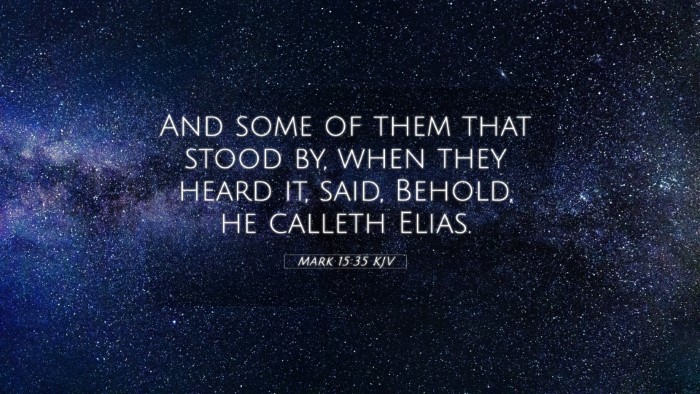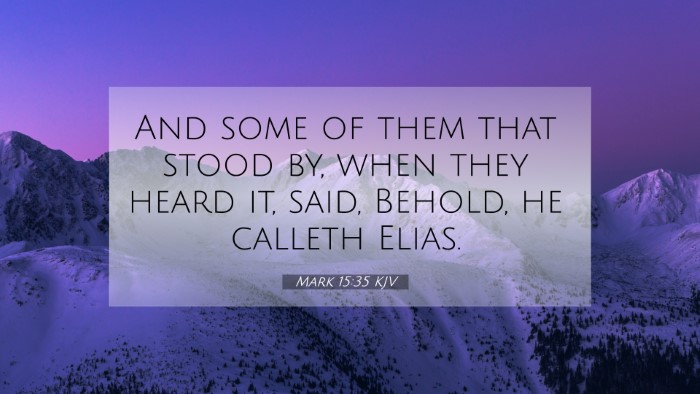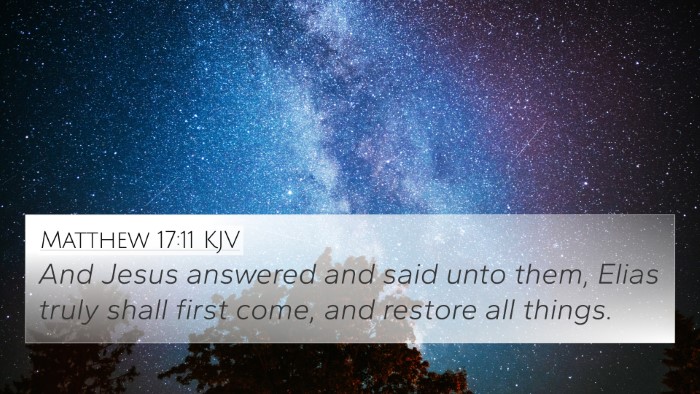Understanding Mark 15:35
Mark 15:35 captures a poignant moment during the crucifixion of Jesus, where the spectators misinterpret His cry; it reads: "And some of those who stood by, when they heard that, said, ‘Look, He is calling for Elijah!’” This verse invites us to explore its profound implications and connections within the broader context of Scripture.
Commentary Insights
Matthew Henry's Commentary: Matthew Henry emphasizes the misunderstanding of the onlookers as they misinterpret Jesus’s cry. It highlights the spiritual blindness that can accompany physical proximity to Jesus and the events surrounding Him. Henry notes that the crowd’s belief that Jesus was calling for Elijah reveals a deep-seated hope that a prophet would come to save them in their distress.
Albert Barnes' Notes: Albert Barnes adds that the reference to Elijah connects to Jewish traditions, where it was thought that Elijah would come to restore all things before the coming of the Messiah. Therefore, the mention of Elijah is not only a recognition of Jesus's suffering but also a misunderstanding of His mission. Barnes points out that this moment illustrates the general ignorance of the people regarding the true nature of Jesus's mission and His identity as the Messiah.
Adam Clarke's Commentary: Adam Clarke highlights the tragedy of the spectators' comment, showing that even in the face of the crucifixion — the climax of Jesus's earthly mission — people remained unaware of what was truly happening. Clarke explains that this verse demonstrates that many people fail to grasp the significance of Christ’s suffering and the fulfillment of Scripture in His death.
Thematic Connections
Mark 15:35 serves as a rich source for thematic Bible verse connections. Here are some notable cross-references that illuminate the verse:
- Malachi 4:5: “Behold, I will send you Elijah the prophet before the coming of the great and dreadful day of the LORD.”
- Matthew 27:47: “Some of those who stood there, when they heard that, said, ‘This Man is calling for Elijah!’”
- Luke 4:25-26: The mention of Elijah in the context of God's mercy extends beyond Israel, emphasizing the universal reach of Jesus’s message.
- John 19:28: Jesus’s awareness of His own suffering and fulfillment of scripture parallels the cries heard by those at the crucifixion.
- Psalms 22:1: "My God, My God, why have You forsaken Me?"—a direct connection to the sentiments expressed by Jesus in this moment.
- Isaiah 53:3: “He is despised and rejected by men”—parallel to the crowd's misinterpretation of Jesus’s suffering.
- Zechariah 4:14: References to the two anointed ones, which allegorically ties back to the figures of hope in times of distress.
- Matthew 16:14: “Some say John the Baptist, some Elijah, and others Jeremiah or one of the prophets”—illustrating the confusion about Jesus's identity.
- Acts 2:16-17: Referring to the pouring out of the Spirit, showing how prophecy continues to unfold beyond the crucifixion.
Cross-Referencing Analysis
To derive a comprehensive understanding of Mark 15:35, tools for Bible cross-referencing are invaluable. By employing a Bible concordance, one can:
- Explore thematic Bible verse connections to understand the fullness of God's message through Christ.
- Utilize a Bible cross-reference guide to trace the prophetic implications of the Old Testament in the New Testament.
- Engage in cross-reference Bible study methods that foster deeper insights into how different scriptures interact.
Conclusion
Mark 15:35 serves not only as an account of an event during Jesus's crucifixion but also as a rich tapestry of biblical connections and interpretations. By investigating the cross-references and utilizing various Bible study tools, one can uncover a more profound understanding of scripture and the fundamental themes surrounding the life and mission of Jesus Christ. In this manner, the verse becomes a focal point for examining the larger narrative of salvation woven throughout the Bible.





